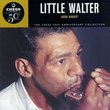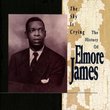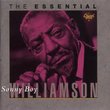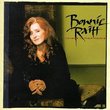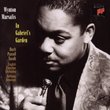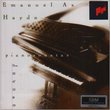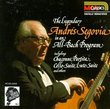| All Artists: Sonny Boy Williamson Title: King Biscuit Time Members Wishing: 5 Total Copies: 0 Label: Arhoolie Records Release Date: 11/30/1993 Genres: Blues, Pop Styles: Chicago Blues, Delta Blues, Traditional Blues, Electric Blues, Harmonica Blues Number of Discs: 1 SwapaCD Credits: 1 UPC: 096297031025 |
Search - Sonny Boy Williamson :: King Biscuit Time
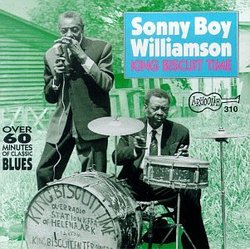 | Sonny Boy Williamson King Biscuit Time Genres: Blues, Pop
|
Larger Image |
CD DetailsSimilar CDs
Similarly Requested CDs
|
CD ReviewsHis Finishing School, Before He Made His Chess Legend BluesDuke | Las Vegas, Nevada | 06/09/2001 (5 out of 5 stars) "For hearing the man born as Alec (Rice) Miller as he had rounded into near-complete game shape, in the years immediately preceding the seminal sides he would cut for Chess beginning in the mid-to-late 1950s, there is no better package than this of Sonny Boy Williamson's incandescent, embryonic recordings for the ancient Trumpet label. Many of these songs would get the Sonny Boy makeover when he re-cut them during his Chess years, and it's intriguing to compare between the Trumpet originals and the Chess refineries of such signature songs as "Eyesight To The Blind," "Cross My Heart," "Nine Below Zero," "Mr. Down Child," and "Mighty Long Time." Then again, the tandem treat is to hear a good enough dollop of some of Sonny Boy's more personal material, particularly the slightly haunting "West Memphis Blues," which he wrote about the fire that actually burned down the house he had bought with his wife. Then, there are the bonuses: one of the last broadcasts of the legendary "King Biscuit Time" on which Sonny Boy would appear before his death; and perhaps the earliest known version Elmore James would cut of his signature "Dust My Broom," this one with Sonny Boy (who was long reputed to have tricked him into cutting it for Trumpet) sliding in with some fills showing he was a deft an accompanist/partner as he was a harmonica virtuoso. Accompanying the cantankerously poetic Sonny Boy, mostly, are such legends of Memphis/Helena blues as guitarist Joe Willie Wilkins (Robert Jr. Lockwood he ain't, but for laying a sensible support and spitting out the occasional fill and run he acquits his own self very nicely), bassist Cliff Bivens, drummer Frock, and pianist Dave Campbell, and they deliver yeoman's work." The REAL King of Rock 'n' Roll? William E Donoghue | Healdsburg CA USA | 09/13/2002 (5 out of 5 stars) "Sonny Boy somehow gets swept into a corner because he only had a few records that were "hits" in the 1950s, "Don't Start Me To Talkin'" and "Mighty Long Time," his masterpiece on this CD. However, when he died, artists including The Moody Blues, Jack Bruce, Jimmy Reed, Paul Jones of Manfred Mann, John Maysll, Van Morrison, Eric Clapton and others recorded tributes to him. He recorded with the Animals and Yardbirds, Jimmy Page, jazzmen Chris Barber and Roland Kirk and others. The real story is that Sonny Boy II (not the same Sonny Boy Williamson who recorded "Good Morning Little School Girl"} was Alex Miller, a blues harp player, songwriter and singer who had been playing in the Mississippi delta since the late 1920s with people like Robert Johnson and Robert Lockwood Jr., Joe Willie Wilkins, Pinetop Perkins, Ike Turner and others. He was THE star of the Delta, so popular he didn't need to record until 1950 when he started to record these sides with Jackosn Mississippi's Trumpet Records. He was an escaped convict who became an international blues star using another man's name (John Lee "Sonny Boy" Williamson among others) and another's as his alias (his brother Willie Miller). He was truly hiding in the spotlight." Seminal! Docendo Discimus | Vita scholae | 08/18/2004 (5 out of 5 stars) "Aleck "Rice" Miller, Sonny Boy Williamson II, was around long enough to have played with Robert Johnson at one end of his career, and with Eric Clapton at the other. He was born at the tail end of the 19th century in Glendora, Mississippi, he taught the basics of blues harmonica to a young Howlin' Wolf, and he was present the night Robert Johnson was poisoned.
And even though he took his moniker from the younger Tennessee bluesman John Lee "Sonny Boy" Williamson, Miller's style was nothing like Williamson's. In fact, no-one really sounded like Rice Miller. His raspy vocal delivery was sly, world-weary, and delightfully evil, and his inimitable harp-playing relied on short, rhythmic bursts one minute and powerful, passionate blowing the next. The liner notes to a 1960s LP of his stated with disturbing seriousness that only a man who had long since sold his soul to the devil in exchange for not having to breathe while performing could sing and play the way Miller did. And Rice Miller was perhaps the best songwriter the blues has ever seen, displaying an attention to detail which is rare in the blues. His songs were full of mordant wit, with largely autobiographical lyrics that truly hold up to the scrutiny of the printed page. This CD collects most of Miller's earliest recordings, his magnificent 1951 Trumpet sides. The raw original versions of several songs that whe would later record for Chess are here, including "Cross My Heart", "Nine Below Zero", "Too Close Together", and the classic "Eyesight To The Blind". And since Miller was already in his early 50s at the time and had established a style of his own many years before, these performances are every bit as impressive as his later Chess sides. Miller is backed by drums, piano, bass and electric guitar, and slide guitar legend Elmore James is credited as one of the guitarists on several tracks, alongside pianist Willie Love and the "eternal sideman", Joe Willie Wilkins. Wilkins taught B.B. King guitar in the 40s, and recorded with Little Walter, Big Walter Horton, Elmore James, Roosevelt Sykes and several others. The fidelity here doesn't match Miller's Chess sides, but there is so much power and grit in these sixty year old recordings that it really doesn't matter all that much. This CD reissue also includes Elmore James' first single, the famous rendition of Robert Johnson's "I Believe I'll Dust My Broom", which features Rice Miller on harp, as well as a thirteen-minute KFFA broadcast from 1965, the year Rice Miller died. That one includes his versions on "V-8 Ford", "Right Now", "Come Go With Me", and T-Bone Walker's "They Call It Stormy Monday". "King Biscuit Time" is a tremendous collection of Sonny Boy in his prime, and a must-have for any and all fans of blues harmonica. 4 1/2 stars - highly recommended." |

 Track Listings (18) - Disc #1
Track Listings (18) - Disc #1